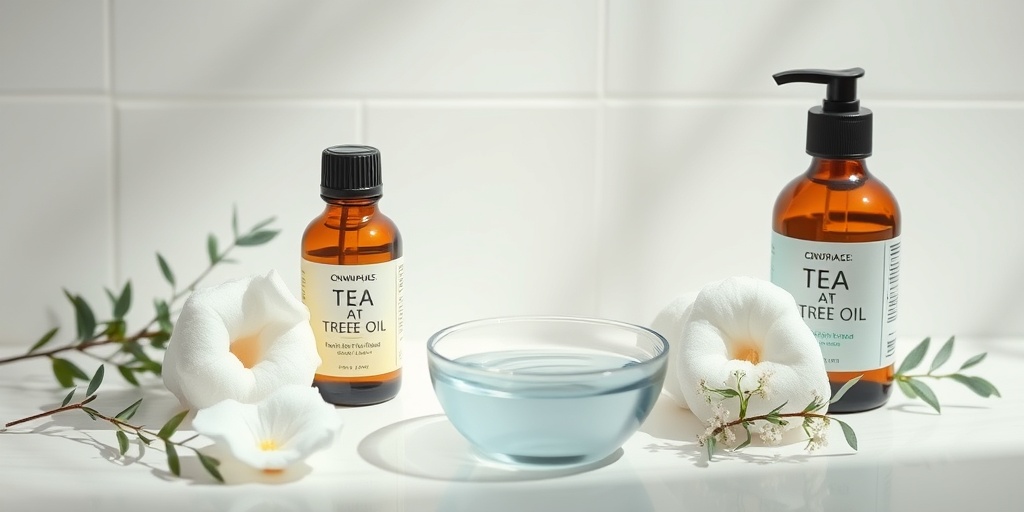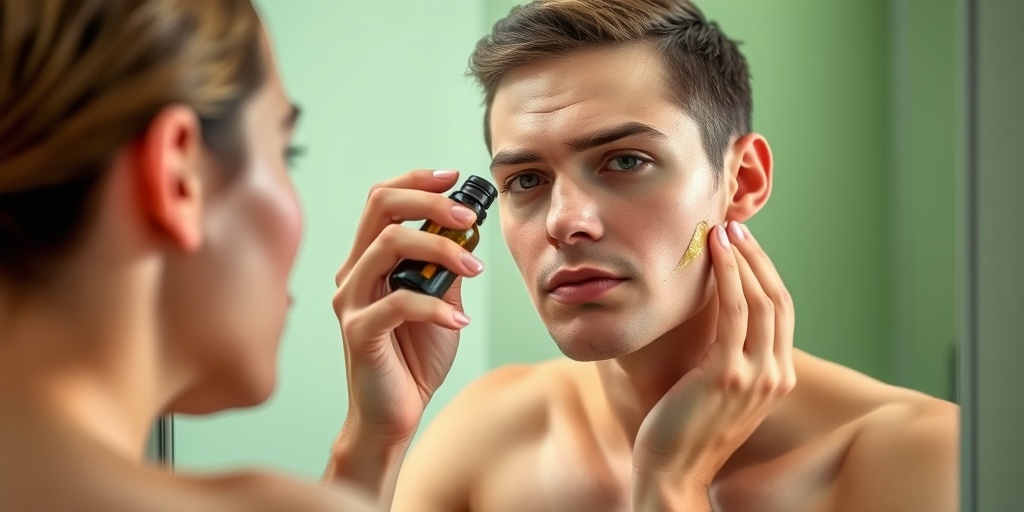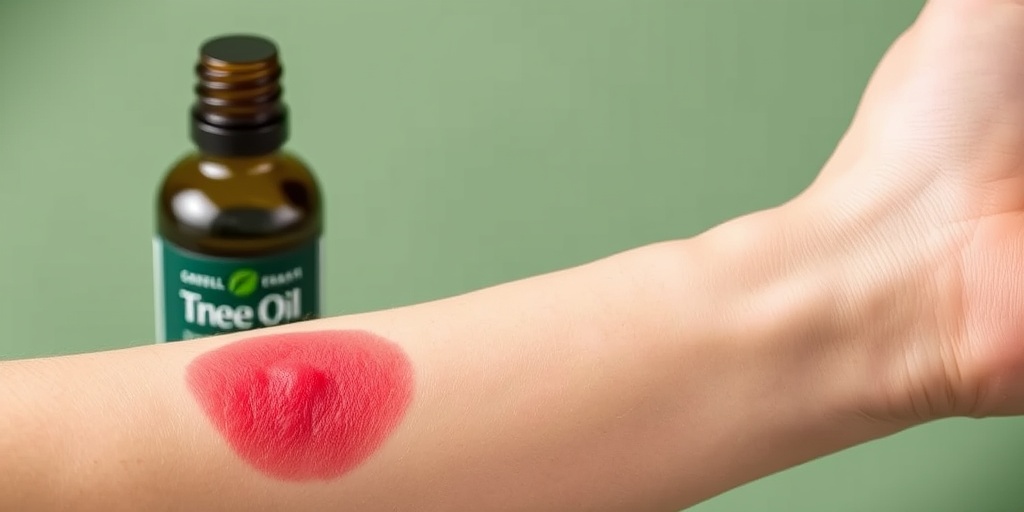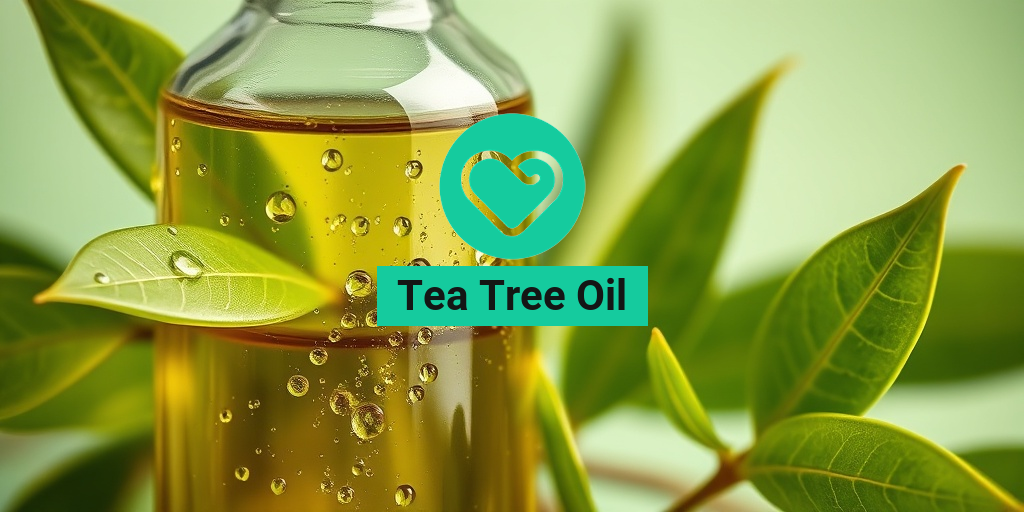What Is Tea Tree Oil?
Tea Tree Oil, derived from the leaves of the Melaleuca alternifolia tree, is a natural essential oil that has been used for centuries for its remarkable healing properties. Native to Australia, this oil is renowned for its potent antimicrobial and anti-inflammatory effects, making it a popular choice in both traditional and modern medicine.
The extraction process involves steam distillation of the leaves, resulting in a clear to pale yellow oil with a fresh, medicinal scent. Its unique composition includes compounds like terpinen-4-ol, which is primarily responsible for its therapeutic benefits. As a versatile oil, tea tree oil can be used in various applications, from skincare to hair care, and even household cleaning products.
How Is Tea Tree Oil Used?
Tea tree oil can be used in several ways, including:
- Topical Application: Diluted with a carrier oil, it can be applied directly to the skin.
- Hair Care: Added to shampoos or conditioners to promote scalp health.
- Household Cleaner: Mixed with water and vinegar for a natural disinfectant.
When using tea tree oil, it’s essential to perform a patch test to ensure there are no allergic reactions, especially for those with sensitive skin. Always consult with a healthcare professional if you have concerns about its use.
Tea Tree Oil Benefits
The benefits of tea tree oil are vast and varied, making it a staple in many households. Here are some of the most notable advantages:
1. Acne Treatment
One of the most popular uses of tea tree oil is for treating acne. Its antibacterial properties help combat the bacteria that cause breakouts, while its anti-inflammatory effects reduce redness and swelling. Applying diluted tea tree oil directly to blemishes can promote clearer skin.
2. Dandruff Relief
For those struggling with dandruff, tea tree oil can be a game-changer. Its antifungal properties help eliminate the yeast-like fungus that often contributes to dandruff. Adding a few drops to your shampoo or using a tea tree oil shampoo can help soothe the scalp and reduce flakiness.
3. Skin Health
Tea tree oil is also beneficial for overall skin health. It can be used to treat minor cuts, burns, and insect bites due to its antiseptic qualities. Additionally, it may help alleviate conditions like eczema and psoriasis when used in a diluted form.
4. Natural Deodorant
With its antibacterial properties, tea tree oil can serve as a natural deodorant. It helps neutralize odor-causing bacteria, making it a great addition to homemade deodorant recipes. Just remember to dilute it properly before applying it to sensitive areas.
5. Household Cleaner
Tea tree oil is not just for personal care; it can also be an effective household cleaner. Its antimicrobial properties make it a powerful ingredient in DIY cleaning solutions. Mixing tea tree oil with water and vinegar can create a natural disinfectant that’s safe for most surfaces.
6. Hair Growth
Some studies suggest that tea tree oil may promote hair growth by improving scalp health and reducing inflammation. Regular use in hair care routines can lead to healthier hair and a more vibrant scalp.
7. Aromatherapy Benefits
In aromatherapy, tea tree oil is often used for its invigorating scent, which can help reduce stress and promote mental clarity. Diffusing tea tree oil in your home can create a refreshing atmosphere while providing its numerous health benefits.
In conclusion, tea tree oil is a versatile and powerful natural remedy that can enhance your health and wellness routine. Whether you’re looking to treat acne, relieve dandruff, or create a cleaner home environment, this essential oil is worth considering. For more evidence-based health answers and tips, visit Yesil Health AI. 🌿✨

Tea Tree Oil Uses
Tea tree oil, derived from the leaves of the Melaleuca alternifolia plant, is renowned for its versatile applications in health and beauty. This essential oil has been used for centuries, particularly in Australia, for its potent antimicrobial and anti-inflammatory properties. Let’s explore some of the most popular uses of tea tree oil that can benefit your daily routine.
1. Natural Antiseptic
One of the most well-known uses of tea tree oil is as a natural antiseptic. Its ability to combat bacteria and fungi makes it an excellent choice for treating minor cuts, scrapes, and burns. Simply dilute a few drops of tea tree oil with a carrier oil, such as coconut or olive oil, and apply it to the affected area to promote healing and prevent infection. 🩹
2. Acne Treatment
Struggling with acne? Tea tree oil may be your new best friend! Its anti-inflammatory properties help reduce redness and swelling, while its antibacterial effects target the bacteria that cause acne. To use, mix a drop of tea tree oil with a carrier oil and apply it directly to blemishes. Regular use can lead to clearer skin over time. 🌟
3. Dandruff Relief
If you’re dealing with an itchy scalp and dandruff, tea tree oil can help. Its antifungal properties combat the yeast that often contributes to dandruff. Add a few drops of tea tree oil to your regular shampoo or create a DIY scalp treatment by mixing it with a carrier oil. Massage it into your scalp, leave it on for 30 minutes, and then wash it out for a flake-free finish. 🧴
4. Household Cleaner
Tea tree oil can also be used as a natural household cleaner. Its antimicrobial properties make it effective for disinfecting surfaces. To create a simple cleaning solution, mix water, vinegar, and a few drops of tea tree oil in a spray bottle. This eco-friendly cleaner can tackle germs in your kitchen and bathroom without harsh chemicals. 🧼
5. Aromatherapy
Incorporating tea tree oil into your aromatherapy routine can promote relaxation and mental clarity. Add a few drops to a diffuser or mix it with a carrier oil for a soothing massage. The refreshing scent can help uplift your mood and reduce stress levels. 🌿
Tea Tree Oil for Skin
When it comes to skincare, tea tree oil is a powerhouse ingredient. Its natural properties make it suitable for various skin concerns, from acne to dryness. Let’s delve into how tea tree oil can enhance your skincare routine.
1. Acne Treatment
As mentioned earlier, tea tree oil is particularly effective for acne-prone skin. Its ability to penetrate the skin and unclog pores helps reduce the occurrence of breakouts. For best results, look for skincare products that contain tea tree oil or create your own spot treatment. Remember to always dilute it before applying directly to the skin to avoid irritation. 🌼
2. Soothing Irritation
Tea tree oil can also soothe irritated skin. Whether you’re dealing with insect bites, rashes, or sunburn, its anti-inflammatory properties can help calm redness and discomfort. Mix a few drops with a carrier oil and gently apply it to the affected area for relief. 🐜
3. Moisturizing Benefits
While tea tree oil is often associated with oily skin, it can also benefit dry skin types. When combined with a nourishing carrier oil, it can help balance oil production and keep your skin hydrated. Look for moisturizers that include tea tree oil to enjoy its benefits without drying out your skin. 💧
4. Anti-Aging Properties
Tea tree oil is rich in antioxidants, which can help combat the signs of aging. By incorporating it into your skincare routine, you can promote a youthful appearance and protect your skin from environmental damage. Consider using products that feature tea tree oil to harness its anti-aging benefits. 🌟
5. Natural Makeup Remover
Struggling to remove stubborn makeup? Tea tree oil can help! Its cleansing properties make it an effective natural makeup remover. Mix a few drops with a carrier oil and gently massage it onto your face to dissolve makeup, followed by a gentle cleanser to remove any residue. 🧖♀️
Incorporating tea tree oil into your skincare routine can lead to healthier, clearer skin. Whether you’re using it for acne, irritation, or as a natural moisturizer, this essential oil is a versatile addition to your beauty arsenal. 🌿

Tea Tree Oil for Hair
Tea tree oil, derived from the leaves of the Melaleuca alternifolia tree, is renowned for its numerous health benefits, particularly for hair care. This essential oil is packed with antimicrobial and anti-inflammatory properties, making it a popular choice for addressing various hair and scalp issues. Let’s explore how tea tree oil can transform your hair care routine!
Benefits of Tea Tree Oil for Hair
- Fights Dandruff: One of the most common issues people face is dandruff. Tea tree oil can help reduce flakiness and soothe an itchy scalp due to its antifungal properties. Regular use can lead to a healthier scalp and reduced dandruff.
- Promotes Hair Growth: By improving blood circulation to the scalp, tea tree oil can stimulate hair follicles, promoting hair growth. This is particularly beneficial for those experiencing thinning hair or hair loss.
- Reduces Scalp Irritation: If you suffer from scalp conditions like psoriasis or eczema, tea tree oil can provide relief. Its anti-inflammatory properties help calm irritation and redness.
- Prevents Lice Infestation: Tea tree oil is a natural insecticide, making it effective in preventing and treating lice infestations. Incorporating it into your hair care routine can help keep these pesky critters at bay.
How to Use Tea Tree Oil for Hair
Incorporating tea tree oil into your hair care routine is simple. Here are a few effective methods:
- Tea Tree Oil Shampoo: Add a few drops of tea tree oil to your regular shampoo. This will enhance its cleansing properties and help combat dandruff and scalp irritation.
- Scalp Massage: Mix a few drops of tea tree oil with a carrier oil, such as coconut or jojoba oil. Massage this mixture into your scalp to promote blood circulation and nourish your hair follicles.
- DIY Hair Mask: Combine tea tree oil with yogurt and honey to create a nourishing hair mask. Apply it to your hair and scalp, leave it on for 30 minutes, and then rinse thoroughly for shiny, healthy hair.
Tea Tree Oil in Hair Products
Many hair care brands have recognized the benefits of tea tree oil and have incorporated it into their products. You can find tea tree oil shampoos, conditioners, and treatments at stores like Rossmann or online. Look for products specifically designed for your hair type and concerns to maximize the benefits.
Tea Tree Oil Precautions
While tea tree oil is generally safe for most people, it’s essential to take certain precautions to ensure its safe use. Here are some important considerations:
Skin Sensitivity
Before applying tea tree oil directly to your scalp or skin, it’s crucial to perform a patch test. Apply a small amount of diluted tea tree oil to a discreet area of skin and wait 24 hours to check for any adverse reactions. If you experience redness, itching, or irritation, discontinue use.
Dilution is Key
Tea tree oil is highly concentrated and should always be diluted with a carrier oil before application. Using it undiluted can lead to skin irritation or allergic reactions. A common dilution ratio is 1-2 drops of tea tree oil per tablespoon of carrier oil.
Avoiding Ingestion
Tea tree oil is meant for external use only. Ingesting tea tree oil can be toxic and lead to serious health issues. Always keep it out of reach of children and pets.
Consulting a Professional
If you are pregnant, nursing, or have a pre-existing medical condition, consult with a healthcare professional before using tea tree oil. They can provide personalized advice based on your health history.
In conclusion, tea tree oil is a versatile and powerful addition to your hair care routine, offering numerous benefits from fighting dandruff to promoting hair growth. However, always remember to use it safely and responsibly to enjoy its full potential! 🌿✨

How to Use Tea Tree Oil
Tea tree oil, derived from the leaves of the Melaleuca alternifolia tree, is renowned for its versatile uses and numerous health benefits. Whether you’re looking to improve your skin, hair, or overall wellness, understanding how to use tea tree oil effectively is essential. Here’s a comprehensive guide on how to incorporate this powerful essential oil into your daily routine.
1. For Skin Care
Tea tree oil is particularly famous for its antimicrobial and anti-inflammatory properties, making it an excellent choice for various skin issues.
- Acne Treatment: To use tea tree oil for acne, dilute a few drops with a carrier oil (like coconut or jojoba oil) and apply it directly to the affected areas using a cotton swab. This can help reduce redness and swelling.
- Wound Healing: Apply diluted tea tree oil to minor cuts and scrapes to promote healing and prevent infection.
- Psoriasis and Eczema Relief: Mix tea tree oil with a moisturizer to soothe irritated skin and reduce flare-ups.
2. For Hair Care
Tea tree oil can also work wonders for your hair and scalp health. Its antifungal properties make it effective against dandruff and other scalp conditions.
- Dandruff Treatment: Add a few drops of tea tree oil to your regular shampoo or conditioner. This can help combat dandruff and promote a healthier scalp.
- Hair Growth: Mix tea tree oil with a carrier oil and massage it into your scalp. This can stimulate hair follicles and encourage growth.
3. For Aromatherapy
Incorporating tea tree oil into your aromatherapy routine can enhance your mood and promote relaxation. Use a diffuser to disperse the oil in your living space, or add a few drops to your bath for a soothing experience. 🛁
4. For Household Cleaning
Tea tree oil is a natural disinfectant, making it a great addition to your cleaning routine. Mix it with water and vinegar to create an effective all-purpose cleaner that can help eliminate germs and odors.
Tea Tree Oil Side Effects
While tea tree oil is generally safe for most people when used correctly, it’s important to be aware of potential side effects. Here are some common reactions and precautions to consider:
1. Skin Irritation
Some individuals may experience skin irritation or allergic reactions when using tea tree oil. It’s advisable to perform a patch test before applying it to larger areas of your skin. To do this, dilute a small amount of tea tree oil with a carrier oil and apply it to a small area. Wait 24 hours to see if any adverse reactions occur.
2. Allergic Reactions
In rare cases, tea tree oil can cause allergic reactions, including redness, itching, or swelling. If you notice any of these symptoms, discontinue use immediately and consult a healthcare professional.
3. Hormonal Effects
There have been reports suggesting that tea tree oil may have hormonal effects, particularly in prepubescent boys. If you have concerns about hormonal imbalances, it’s best to consult with a healthcare provider before using tea tree oil.
4. Ingestion Risks
Tea tree oil is toxic when ingested. It should never be taken orally, and care should be taken to keep it out of reach of children and pets. If ingestion occurs, seek medical attention immediately.
5. Pregnancy and Breastfeeding
While tea tree oil is often considered safe for topical use, pregnant or breastfeeding women should consult their healthcare provider before using it, as there is limited research on its effects during these periods.
In conclusion, tea tree oil is a versatile and powerful natural remedy that can benefit your skin, hair, and home. However, it’s essential to use it responsibly and be aware of potential side effects. Always consult with a healthcare professional if you have any concerns or pre-existing conditions. 🌿

Frequently Asked Questions about Tea Tree Oil
What is Tea Tree Oil?
Tea Tree Oil is a natural essential oil derived from the leaves of the Melaleuca alternifolia tree, native to Australia. It is known for its antiseptic and anti-inflammatory properties, making it a popular choice for various skin and hair care applications.
How can I use Tea Tree Oil for skin care?
You can use Tea Tree Oil for skin care by diluting it with a carrier oil, such as coconut or jojoba oil, and applying it to areas affected by acne or blemishes. It can also be added to your regular moisturizer for added benefits.
Is Tea Tree Oil effective for acne treatment?
Yes, Tea Tree Oil is often used as a natural remedy for acne due to its antibacterial properties. It helps to reduce inflammation and can prevent future breakouts when applied regularly.
Can I use Tea Tree Oil for hair care?
Absolutely! Tea Tree Oil can be beneficial for hair care, particularly for treating dandruff and promoting a healthy scalp. You can add a few drops to your shampoo or mix it with a carrier oil and massage it into your scalp.
Where can I buy Tea Tree Oil?
Tea Tree Oil is widely available at health food stores, pharmacies, and online retailers. Popular brands include those found at Rossmann and The Body Shop.
Are there any side effects of using Tea Tree Oil?
While Tea Tree Oil is generally safe for most people, it can cause skin irritation in some individuals. It is recommended to perform a patch test before using it extensively. If you experience any adverse reactions, discontinue use immediately.
Can I use Tea Tree Oil for dandruff?
Yes, Tea Tree Oil is effective in treating dandruff due to its antifungal properties. Incorporating it into your hair care routine can help alleviate symptoms and promote a healthier scalp.
Is Tea Tree Oil safe for children?
While Tea Tree Oil can be used for children, it should be diluted properly and used with caution. Always consult with a pediatrician before using essential oils on young children.
How should I store Tea Tree Oil?
To maintain its potency, store Tea Tree Oil in a cool, dark place, away from direct sunlight. Ensure the bottle is tightly sealed to prevent oxidation.
Can I use Tea Tree Oil in my DIY skincare products?
Yes, Tea Tree Oil is a popular ingredient in DIY skincare formulations. Just remember to dilute it properly and combine it with other skin-friendly ingredients for the best results.




